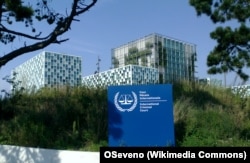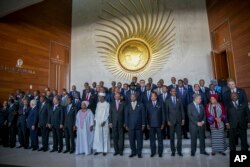South Africa’s High Court ruled Wednesday that the government cannot withdraw from of the International Criminal Court without parliamentary approval.
Constitutional activists briefly celebrated the legal victory Wednesday, and in the next breath warned that the High Court ruling does not mean South Africa’s fight over the International Criminal Court is over.
An October notice of intent to withdraw from the war crimes court was made by South Africa’s Cabinet, but the High Court ruled only parliament can make such a call. The Cabinet is composed of stalwarts from the ruling African National Congress, so their decision to withdraw from the ICC did not allow the opposition to effectively argue. That October decision prompted the opposition Democratic Alliance to lead this case to court.
Victory for activists
Executive director Kaajal Ramjathan-Keogh leads the Southern Africa Litigation Center that was involved in the case as a supporting respondent. The advocacy group has long argued South Africa should remain in the court.
"I do not think it means that South Africa will now say that it will remain with the International Criminal Court. And much the opposite would be true," she said. "South Africa is determined to leave the International criminal Court, and I think thy are going to follow the necessary procedures that it takes in order to remove themselves procedurally and substantively, in the correct way.”
She says those who want to leave the court will have to start over and take their case to parliament, where it is likely the ANC will fight to withdraw.
South Africa announced its intent to leave the court in 2015, citing the government's decision to give Sudan's wanted president diplomatic immunity during an African Union summit. South African officials declined to move on his ICC arrest warrant.
Centre for Constitutional Rights director Phephelaphi Dube notes this ruling allows another, critical, group to contribute to the debate.
“Now that that process is before parliament, parliament will be forced to open up the process to the public, so in that sense, then the public can then make their comments," said Dube.
Political issue
The legal experts said the issue eventually will come down to politics. The ANC dominates parliament, and it has come out strongly in favor of withdrawal.
But the opposition will fight back hard, says Shadow Minister of International Relations and Cooperation's Stevens Mokgalapa of the Democratic Alliance.
“We will definitely be quoting this judgement as a basis for non-withdrawal from the ICC. And we will continue to challenge, through parliamentary processes, any effort to withdraw from the ICC," said Mokgalapa.
Gambia, recently reversed its decision to leave the court, but Dube says she does not think that will convince other African nations to stay, especially after an AU decision last month it would support any member’s bid to leave the court.
“One wants to be positive about it, but I think at the same time, for a very long time a lot of African states, and including the African Union, have been of the view that the ICC is unfairly targeting African countries,” said Dube.
She says the ruling gives South Africa, and possibly other nations, pause to think about whether they really want to go through this lengthy and complicated process.






